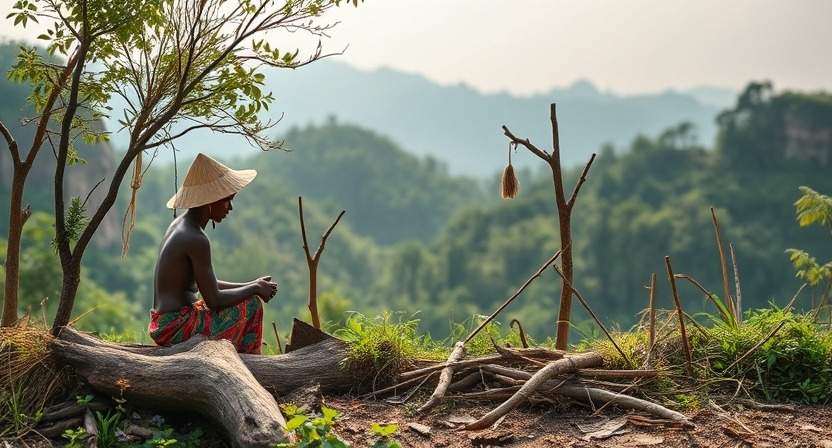In today’s world, as we face growing environmental challenges, there is much to learn from the rich and diverse knowledge systems of Indigenous communities. For centuries, Indigenous peoples have lived in harmony with nature, relying on traditional ecological wisdom to preserve ecosystems and maintain balance with their surroundings. This blog explores how modern sustainability practices can benefit from Indigenous knowledge and why it is crucial to respect and integrate these teachings into our global efforts.
What is Indigenous Knowledge?
Indigenous knowledge refers to the unique understandings, practices, and philosophies developed by Indigenous communities over generations. It is deeply rooted in their connection to the land, water, and biodiversity. Unlike mainstream scientific approaches, Indigenous knowledge emphasizes a holistic view of ecosystems, focusing on the interconnectedness of all living and non-living things.
For example, Aboriginal Australians have a profound understanding of the land and its cycles. Their practices, such as controlled burns, are not only cultural rituals but also effective methods of land management that reduce the risk of wildfires and promote biodiversity.
Lessons from Traditional Ecological Wisdom
1. Living in Harmony with Nature
Indigenous communities view themselves as part of the ecosystem rather than separate from it. This mindset fosters sustainable practices that prioritize long-term health over short-term gains. For instance:
- Hunting and Fishing Practices: Many Indigenous groups follow seasonal cycles and only harvest what is needed, ensuring the regeneration of species.
- Sacred Groves and Protected Areas: In many cultures, specific areas are considered sacred and left untouched, allowing biodiversity to thrive.
2. Sustainable Agriculture
Traditional farming methods, such as polyculture and crop rotation, are valuable lessons in sustainability. These techniques improve soil fertility, reduce pests naturally, and maintain ecological balance.
- The “Three Sisters” planting technique used by Native American communities—growing corn, beans, and squash together—is a classic example. Each crop supports the others, enhancing productivity without harming the soil.
3. Water Resource Management
Water is sacred in many Indigenous cultures, and its conservation is a priority. Practices such as building small check dams and using traditional irrigation methods can guide modern water management strategies.
- In India, traditional stepwells and rainwater harvesting systems have inspired contemporary solutions to water scarcity.
4. Fire Management
Indigenous fire management techniques, such as cultural burning, are gaining recognition for their role in reducing wildfire risks and enhancing biodiversity. These controlled burns mimic natural fire cycles, clearing out dry vegetation and promoting new growth.
Modern Sustainability Meets Ancient Wisdom
As the world grapples with climate change, deforestation, and loss of biodiversity, there is an increasing need to integrate Indigenous knowledge into modern sustainability efforts. Here’s how:
1. Co-Management of Natural Resources
Collaborative management between Indigenous communities and governments can lead to better conservation outcomes. For example, Australia’s Kakadu National Park is co-managed by the Bininj/Mungguy people and the government, ensuring traditional knowledge is central to its preservation.
2. Restorative Practices
Rewilding projects and habitat restoration can draw inspiration from Indigenous practices, such as planting native species and mimicking natural ecosystem processes.
3. Ethical and Inclusive Policies
Recognizing the rights and sovereignty of Indigenous peoples is essential for sustainable development. Policies that include Indigenous voices ensure that traditional practices are respected and not exploited.
Challenges in Integrating Indigenous Knowledge
Despite its value, integrating Indigenous knowledge into modern practices comes with challenges:
- Loss of Knowledge: Colonization and globalization have led to the erosion of traditional practices.
- Lack of Recognition: Indigenous knowledge is often undervalued or dismissed as unscientific.
- Intellectual Property Rights: Ensuring that Indigenous communities retain ownership of their knowledge is a critical issue.
Overcoming these barriers requires collaboration, respect, and a commitment to preserving Indigenous heritage.
Success Stories: Indigenous Knowledge in Action
1. New Zealand’s Māori Guardianship
The concept of kaitiakitanga (guardianship) emphasizes the Māori people’s responsibility to protect the environment. It has been integrated into New Zealand’s resource management policies, resulting in sustainable fisheries and protected landscapes.
2. Peru’s Potato Park
In the Andes, Indigenous farmers have created a “Potato Park” to conserve native potato varieties. This initiative combines traditional farming practices with scientific research, safeguarding biodiversity and food security.
3. Canada’s Indigenous-Led Conservation
Indigenous Protected and Conserved Areas (IPCAs) are gaining momentum in Canada, where First Nations communities lead conservation efforts, blending traditional knowledge with modern tools.
The Path Forward
The lessons from Indigenous knowledge systems offer a roadmap for sustainable living. To truly address today’s environmental challenges, we must:
- Respect Indigenous Rights: Acknowledge their sovereignty and role as stewards of the land.
- Promote Collaboration: Foster partnerships between Indigenous communities, scientists, and policymakers.
- Educate and Advocate: Raise awareness about the value of traditional ecological wisdom.
Conclusion
Indigenous knowledge is a treasure trove of sustainability insights, offering time-tested solutions for preserving ecosystems and living in harmony with nature. By integrating this wisdom into modern practices, we can build a more resilient and sustainable future—one that honors the past while protecting the planet for generations to come.







